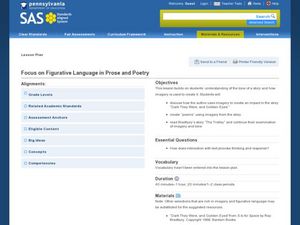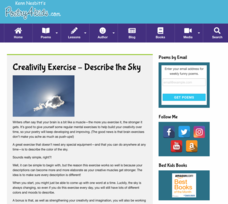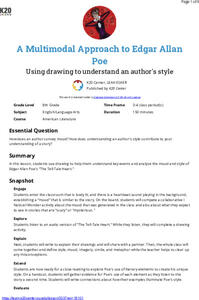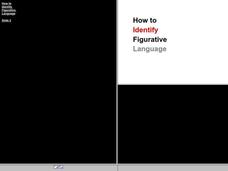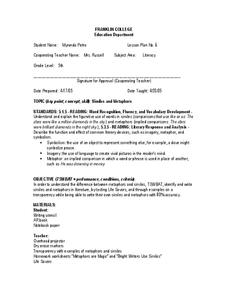Poetry4kids
Personification Poetry Lesson Plan
Scholars take part in two exercises to boost their knowledge of personification. After reading a detailed description and excerpts from famous poems, writers list action verbs and objects then combine words to create a humorous...
Curated OER
Can You Figure Language?
Eighth graders study similes and metaphors and how to explain and create them. After a lecture/demo, 8th graders access websites and worksheets imbedded in this plan to create their own writing.
Curated OER
Figure of Speech
Examine the changing nature of language in the U.S. View and discuss excerpts from a PBS documentary with your class and then conduct Internet research, and complete a team project on the evolution of teen expressions.
Curated OER
Amelia Earhart
Your class can learn about Amelia Earhart and practice important comprehension skills here. Learners answer questions about cause and effect, compare texts, and discuss similes and metaphors after reading Amelia Earhart: Free in the...
Curated OER
Extra Practice with Time: Using menos
How do you tell time in Spanish? Provide each learner with this reference guide and practice sheet to introduce telling time in another language. Begin by reading through the first two informational pages that describe how time is...
Curated OER
Focus on Figurative Language in Prose and Poetry
Students place emphasis on the use of figurative language when analyzing prose and poetry. In this figurative language lesson, students explore the tone of a story and its imagery. Students read and discuss how the author uses imagery in...
Curated OER
Figurative Language and Symbolism
Students identify figurative language and symbolism in poetry as well as prose. In this literary elements lesson, students read and discuss the role of symbolism in Yellow Man by Moonlight, A Christmas Carl, The House of Wings, and...
Curated OER
Identifying Figurative Language
In this figurative language worksheet, students identify figurative language in the sentences and explain their answers. Students complete 10 problems.
Curated OER
Out of the Dust: Figurative Language
Students find examples of figurative language in "First Rain" in Out of the Dust. In this Out of the Dust lesson, students takes notes on various type of figurative language and identify examples of each type in the poem.
Curated OER
Literary Techniques
Need to review literary terms/techniques with your class? The slides in this presentation define and give examples of 22 common literary terms. The PowerPoint could be used for AP test prep.
EngageNY
Volume of Composite Solids
Take finding volume of 3-D figures to the next level. In the 22nd lesson of the series, learners find the volume of composite solids. The lesson the asks them to deconstruct the composites into familiar figures and use volume formulas.
E Reading Worksheets
Idioms Test
How well do your class members understand the figurative meaning of idioms? Find out with this 15 question multiple choice assessment.
National Endowment for the Humanities
Language Analysis Based on Stave 1
Class members meet the original scrooge, the Dickens character whose name has become synonymous with a cold-hearted, tight-fisted, miser. Using the provided worksheet, readers closely examine context clues to determine the meanings of...
Core Knowledge Foundation
Sixth Grade Poetry
Study some of the most prominent poets and works of poetry in history with a language arts poetry unit. From Virgil to Shakespeare to Dickinson to Angelou, the resources present biographies and examples of poetic elements to the sixth...
Poetry4kids
Creativity Exercise - Describe the Sky
Scholars stretch their writing muscles with an exercise that asks them to describe the sky using similes and metaphors.
Tell City Schools
The Cay
Support your instruction of The Cay by Theodore Taylor with this extensive unit of materials. Provided here are prereading activities, worksheets and discussion questions for the entire book, and reading quizzes that you can use to check...
Roald Dahl
The Twits - The Wormy Spaghetti
What do spiders' legs and an octopus's eyeball have to do with metaphors? The fourth lesson in an 11-part unit designed to accompany The Twits by Roald Dahl uses disgusting foods to teach about metaphoric writing.
Helena-West Helena School District
I Know Why the Caged Bird Sings Instructional Unit Plan
Maya Angelou's first autobiography, I Know Why the Caged Bird Sings, demonstrates both the author's exemplary writing and the themes of gender and racial injustice that perpetuate beyond the limits of the 20th century. Use a thorough...
K20 LEARN
A Multimodal Approach To Edgar Allan Poe Using Drawing To Understand An Author's Style
True! Poe's "The Tell-Tale Heart" makes readers nervous. But how? Young scholars create a drawing while listening to a reading of Poe's eerie tale to understand how writers create the mood of their stories and what their writing style...
Curated OER
How To Identify Figurative Language
Students investigate writing techniques by analyzing a chart. In this figurative language lesson, students define similes, metaphors and identify the difference between them and personification. Students demonstrate their understanding...
Curated OER
Chalkboard Challenge: Literary Terms
This interactive PowerPoint simulates a "Jeopardy" game that addresses figurative language, cause and effect, and other literary terms. Players can chose which category and amount they would like to play on the Game Board.
Curated OER
Similes and Metaphors
Reward your class with tasty treats while teaching them about simile and metaphor. After a teacher demo and explanation of simile and metaphor, pupils read books, looking for examples of these literary devices and copying them down....
Curated OER
A Creative Presentation
Bring writing to life with this lesson in which elementary and middle schoolers create a display of the imagery they identify in a series of Gary Paulsen books. They read the suggested materials, identify imagery and descriptive...
Curated OER
Lots of Lessons from Aesop
Aesop’s Fables offer young learners an opportunity to study figurative language. After reviewing theme, simile, alliteration, and metaphor, model for your pupils how to identify examples of these devices in the fable. Class members then...







